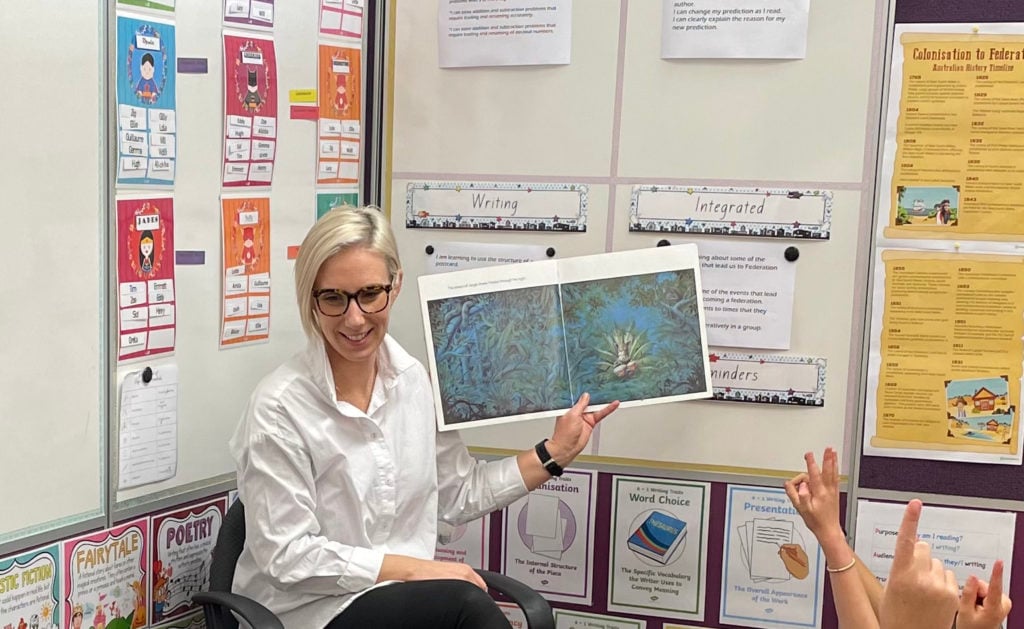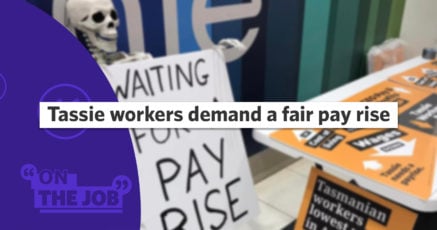For primary school teacher Bek Fewkes, the sound of the school bell at the end of classes doesn’t mean the end of her workday, far from it.
“Not very much of my workday is over. The other point is that it’s not just after school that we’re working. It’s very unusual to get to a staff car park at eight o’clock in the morning and find that it’s not at least three-quarters full. So, the day starts very early and quite often goes quite late,” Fewkes told “On the Job.”
“Generally, at least a couple of nights a week we have meetings. Those meetings range from dealing with everything from administration, organising camps, or talking about what’s in the calendar coming up and delegating different roles, to different people.
“If we’re not in meetings which we are required to attend, we’re catching up across teams and talking to each other collegiately, trying to have those professional discussions and doing just the basic work that’s required in the classroom.
“When I come home from work, I check in with my own child, and make sure that he’s going okay, start dinner, and then we all have our books out, everybody’s back at the table doing homework and schoolwork. And we try really hard to pull the pin by 8:30 pm.
“When it’s reporting time, it is full weekends that have to be locked out to be able to get the work done at the level that is suitable to go out to parents.”
Bek’s story reflects the incredible demands that are made of teachers in public schools all over Australia. Teaching is a vocation, and the commitment made by those who enter the profession is wholehearted, driven by a commitment to give their students the very best education possible.

But this commitment comes at a cost for Australia’s teachers, who are overworked, underpaid and at breaking point.
The Australian Education Union (AEU) recently conducted a survey of 8,581 teachers, principals and education staff from 552 Victorian government schools. The survey revealed that staff worked 276,235 unpaid hours on report writing and related activity during term two alone – that’s an average of 32 unpaid hours per individual.
According to AEU Victorian branch president Meredith Peace, it’s an unsustainable situation.
“We’re deeply concerned but not surprised about that level of work that is required in people’s own time. We think it’s excessive, and it needs to be addressed,” Peace told ‘On the Job’.
“Reporting to parents is actually required, it’s part of the job that you are required to do. All staff take that very seriously. It’s important information for students and their families about their progress.
“Teachers and staff, as they do with so many things, go above and beyond. A survey we did earlier in the year showed that teachers are doing an average of 15 hours of unpaid overtime every week. Principals are doing 60-hour weeks whilst support staff can’t actually get their required work done in their paid hours.”
The AEU has called on the Victorian Government to commit more investment in public schools and to implement adequate measures to alleviate excessive workloads.
Meredith Pearce points out that teachers all over the country are facing the same challenges.
“It is a national problem. There’s a lot that goes on in schools, which takes staff away from their core work.
“Many teachers say to us that just about every hour their day at work is filled up with some particular tasks and then all of the work that they might do around the preparation and planning for classes gets pushed to weeknights and weekends.
“That’s the core work, that’s the most important work we do. As educators, that’s what they deliver to our kids in the classroom. That should be done at work, where you’re able to collaborate with your colleagues, you’ve got access to all your resources.
“I just don’t think it’s acceptable anymore.”
For teachers like Ben Fewkes, work-life balance is out the window as she tries to meet the demands of her job. Fewkes works in a regional Victorian primary school. She loves her job, but increasingly, it’s becoming all-consuming.
“I think that there’s just this culture of expectation that teachers will happily give away all of that time, without any recognition of the impact that that has on your own relationships with your own children, with your partner with yourself,” she said.
“My friends and my family know that I’m not available for social events, and they don’t even invite me anymore, because my weekend has to be spent getting that really large amount of work done, because the rest of my workload doesn’t stop.”
Meredith Peace is focused on winning greater support for teachers and staff and believes their case is too compelling to ignore.
“We want to see staff have greater control over how they use their hours at work, so that they can complete that really important core work of planning and preparation whilst they’re at work.
“You can’t continue to operate on the basis of goodwill from staff, whilst they’re exhausted and they’re burning out. People are saying to us they’re thinking about leaving, and of course, it doesn’t attract people into our profession.
“So, it’s a massive problem, and one which we think the Government needs to address by investing in our public schools.”













SHARE:
Teachers are going above and beyond and paying the price